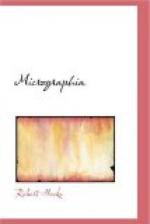* * * * *
Observ. XXX. Of the Seeds of Poppy_._
The small seeds of Poppy, which are described in the 19. Scheme, both for their smalness, multiplicity and prettiness, as also for their admirable soporifick quality, deserve to be taken notice of among the other microscopical seeds of Vegetables: For first, though they grow in a Case or Hive oftentimes bigger then one of these Pictures of the microscopical appearance, yet are they for the most part so very little, that they exceed not the bulk of a small Nitt, being not above 1/32 part of an Inch in Diameter, whereas the Diameter of the Hive of them oftentimes exceeds two Inches, so that it is capable of containing near two hundred thousand, and so in all likelihood does contain a vast quantity, though perhaps not that number. Next, for their prettiness, they may be compar’d to any microscopical seed I have yet seen; for they are of a dark brownish red colour, curiously Honey-comb’d all over with a very pretty variety of Net-work, or a small kind of imbosment of very orderly rais’d ridges, the surface of them looking not unlike the inside of a Beev’s stomack. But that which makes it most considerable of all, is, the medicinal virtues of it, which are such as are not afforded us by any Mineral preparation; and that is for the procuring of sleep, a thing as necessary to the well-being of a creature as his meat, and that which refreshes both the voluntary and rational faculties, which, whil’st this affection has seis’d the body, are for the most part unmov’d, and at rest. And, methinks, Nature does seem to hint some very notable virtue or excellency in this Plant from the curiosity it has bestow’d upon it. First, in its flower, it is of the highest scarlet-Dye, which is indeed the prime and chiefest colour, and has been in all Ages of the world most highly esteem’d: Next, it has as much curiosity shew’d also in the husk or case of the seed, as any one Plant I have yet met withall; and thirdly, the very seeds themselves, the Microscope discovers to be very curiously shap’d bodies; and lastly, Nature has taken such abundant care for the propagation of it, that one single seed grown into a Plant, is capable of bringing some hundred thousands of seeds.
It were very worthy some able man’s enquiry whether the intention of Nature, as to the secundary end of Animal and Vegetable substances might not be found out by some such characters and notable impressions as these, or from divers other circumstances, as the figure, colour, place, time of flourishing, springing and fading, duration, taste, smell, &c. For if such there are (as an able Physician upon good grounds has given me cause to believe) we might then, insteed of studying Herbals (where so little is deliver’d of the virtues of a Plant, and less of truth) have recourse to the Book of Nature it self, and there find the most natural, usefull, and most effectual and specifick Medicines, of which we have amongst Vegetables, two very noble Instances to incourage such a hope, the one of the Jesuite powder for the cure of intermitting Feavers, and the other of the juice of Poppy for the curing the defect of sleeping.




